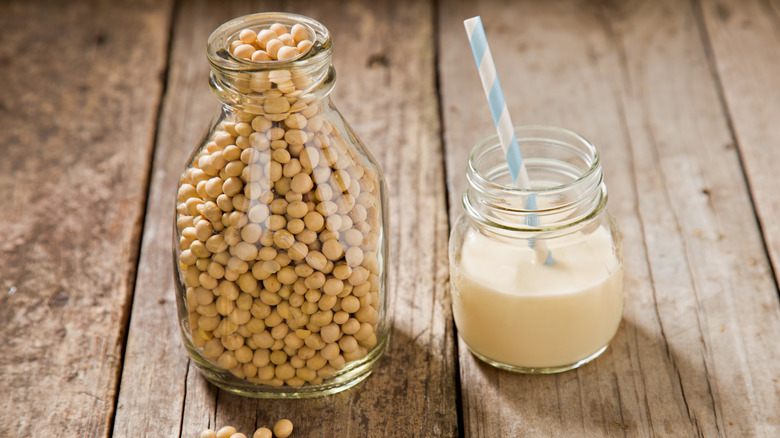The Unexpected Drink That Has As Much Protein As A Glass Of Milk
A glass of milk goes with many of your favorite childhood foods, like a few chocolate chip cookies or a peanut butter and jelly sandwich. Even if you gave up milk as a teenager, Coke just doesn't mix well with these foods. Unless you have a lactose intolerance, milk gives you plenty of nutrition. A cup of low-fat milk has just 106 calories and 8 grams of protein, and you'll also get key minerals such as calcium, magnesium, and potassium.
Those who might be lactose intolerant or just hate the taste of milk could get similar nutrients in a cup of unsweetened soy milk. Depending on your brand of soy milk, you'll find at least 8 grams of protein and about the same amount of potassium. Soy milk has a little less calcium than milk, but has 75% more magnesium. Soy milk is also a good source of iron, a mineral lacking in a glass of milk. You might want to consider adding soy milk to your diet because its protein and isoflavones can protect you from certain diseases.
Soy protein is good for metabolic and liver health
People who drink little to no alcohol can develop non-alcoholic fatty liver disease due to obesity, insulin resistance, type 2 diabetes, or a diet high in fat. A 2019 study in the Journal of the American College of Nutrition looked at the effect of adding soy milk to the diets of people with non-alcoholic fatty liver disease. Compared to people on a low-calorie diet, people who drank about a cup of soy milk combined with a low-calorie diet for eight weeks saw reduced levels of liver inflammation and enzymes connected to liver injury.
Metabolic syndrome can increase your risk of diabetes, stroke, and heart disease because it's tied to conditions such as high blood pressure, high blood sugar, high cholesterol, and excess abdominal fat. The protein in soy might be able to address some of these factors, according to a 2014 study in the Journal of Nutrition. Postmenopausal women with abdominal obesity who swapped 30 grams of soy protein for some of the meat in their moderately high-protein diet improved insulin sensitivity, reduced total cholesterol by 4%, and lowered LDL cholesterol by 9% compared to diets without soy protein.
Soy isoflavones protect women's and men's health
The 25 milligrams of isoflavones in a cup of soy milk have been shown to improve various aspects of your health, according to a 2016 review in Nutrients. Soy isoflavones are also known as phytoestrogens because they bind to estrogen receptors and can show effects similar to estrogen. That's what makes the isoflavones and calcium in soy milk protect postmenopausal women against osteoporosis. Soy isoflavones could also reduce the frequency and severity of hot flashes in perimenopausal women.
A glass or two of soy milk might also improve depression in postmenopausal women. Between 25 and 50 milligrams a day of soy isoflavones were found to alleviate depression and insomnia. Soy isoflavones could also make your antidepressant medication more effective, according to a 2014 pilot study in Acta Poloniae Pharmaceutica. Although taking 100 milligrams of soy isoflavones was found to improve menopausal depressive disorder, those who took soy isoflavones and 50 milligrams of sertraline (Zoloft) saw a significantly higher improvement in their symptoms.
Isoflavones in soy might also protect men from prostate cancer through two actions. First, soy isoflavones can slow down the spreading of cancer cells. Second, they bind with estrogen receptors in prostate cells to prevent growth and support the natural death of cancer cells.



